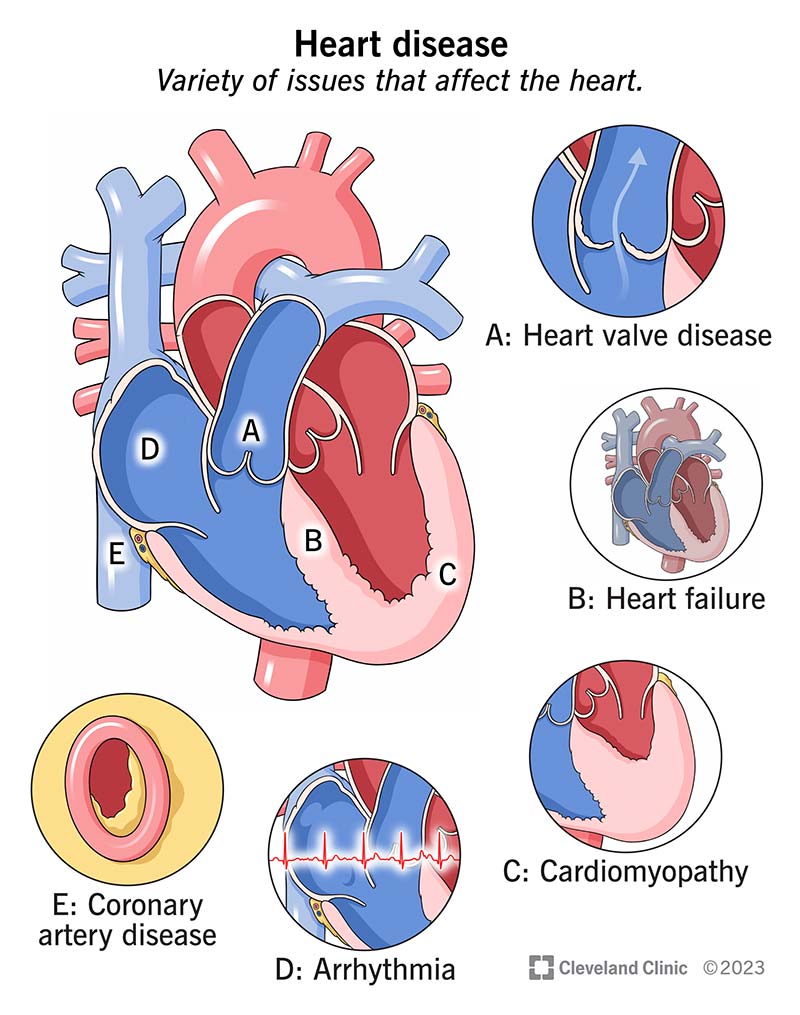
Angiography
Overview
Heart disease describes a range of conditions that affect the heart. Heart disease includes:
Blood vessel disease, such as coronary artery disease. Irregular heartbeats, called arrhythmias. Heart conditions that you're born with, called congenital heart defects. Disease of the heart muscle. Heart valve disease.Symptoms
Heart disease symptoms depend on the type of heart disease. Symptoms of heart disease in the blood vessels
Coronary artery disease is a common heart condition that affects the major blood vessels that supply the heart muscle. A buildup of fats, cholesterol and other substances in and on the artery walls usually causes coronary artery disease. This buildup is called plaque. The buildup of plaque in the arteries is called atherosclerosis (ath-ur-o-skluh-ROE-sis). Atherosclerosis reduces blood flow to the heart and other parts of the body. It can lead to a heart attack, chest pain or a stroke.
Symptoms of coronary artery disease can include:
Chest pain, chest tightness, chest pressure and chest discomfort, called angina. Shortness of breath. Pain in the neck, jaw, throat, upper belly or back. Pain, numbness, weakness or coldness in the legs or arms if the blood vessels in those body areas are narrowed.You might not be diagnosed with coronary artery disease until you have a heart attack, angina, a stroke or heart failure. It's important to watch for heart symptoms. Talk with your healthcare team about any concerns. Heart disease can sometimes be found early with regular health checkups. Heart disease symptoms caused by irregular heartbeats, called arrhythmias
The heart may beat too quickly, too slowly or irregularly. Heart arrhythmia symptoms can include:
Chest pain or discomfort. Dizziness. Fainting or almost fainting. Fluttering in the chest. Lightheadedness. Racing heartbeat. Shortness of breath. Slow heartbeat.Heart disease symptoms caused by congenital heart defects
A congenital heart defect is a heart condition present at birth. Serious congenital heart defects usually are noticed soon after birth. Congenital heart defect symptoms in children could include:
Blue or gray skin. Depending on skin color, these changes may be easier or harder to see. Swelling in the legs, belly area or areas around the eyes. In an infant, shortness of breath during feedings, leading to poor weight gain.Some congenital heart defects may not be found until later in childhood or during adulthood. Symptoms may include:
Getting very short of breath during exercise or activity. Easily tiring during exercise or activity. Swelling of the hands, ankles or feet.Heart disease symptoms caused by diseased heart muscle, called cardiomyopathy
In the beginning, cardiomyopathy may not cause noticeable symptoms. As the condition gets worse, symptoms may include:
Dizziness, lightheadedness and fainting. Fatigue. Feeling short of breath during activity or at rest. Feeling short of breath at night when trying to sleep, or waking up short of breath. Rapid, pounding or fluttering heartbeats. Swollen legs, ankles or feet.Heart disease symptoms caused by heart valve disease
The heart has four valves. The valves open and close to move blood through the heart. Many things can damage the heart valves. If a heart valve is narrowed, it's called stenosis. If a heart valve lets blood flow backward, it's called regurgitation.
Symptoms of heart valve disease depend on which valve isn't working right. Symptoms may include:
Chest pain. Fainting or almost fainting. Fatigue. Irregular heartbeats. Shortness of breath. Swollen feet or ankles.When to see a doctor
Get emergency medical help if you have these heart disease symptoms:
Chest pain. Shortness of breath. Fainting.